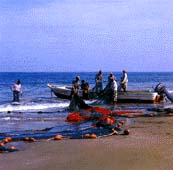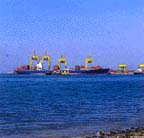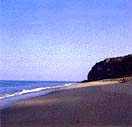
|
|
Out in to the desert, through the Hajar mountains and over numerous wadis, the couple of hours it takes to get there are a worthwhile investment. And when you arrive, the empty sandy beaches and proud headlands pay you back with interest.
Below the surface of the water though, is a different matter, with this area of the Emirates' waters providing some of the country's most fascinating snorkelling and diving. Those at ease on the beach may be distantly aware of the tankers waiting offshore in the Gulf of Oman, for it is certainly not only relaxation that the East Coast has to offer- business too is booming. The ports of Khor Fakkan and Fujairah have a distinct geographical advantage; they are so near to the Strait of Hormuz, but yet not in the Arabian Gulf - marine transport links to envy! Ship owners are able to deliver goods in containers to these two ports and have them sent to their final destination (say elsewhere in the GCC, or beyond) by road, air or a different ship. That way, an expensive-to-run vessel can be freed up for more cargo to be delivered elsewhere.
The crews from these boats provide a spin-off in the town of Fujairah: it is estimated 30,000 sailors and their wages visit each year. Not content with relying on this industry, Fujairah is looking forward to the next century, and is due to be the location for the UAE's first oil refinery outside the Emirate of Abu Dhabi. Once that project is up and running, industrialists on the other side of the mountains expect other ventures to flow in. It seems their optimism may be well-placed. So take the time and make the journey to discover the other sideof the mountains
|
Julia Wheeler |


 Tourism in this part of the Emirates has taken off in recent years, with international holidaymakers (mostly from Europe) making the trip, as well as those with less of a journey behind them. Fujairah and Sharjah's Khor Fakkan resort provide a very different holiday experience to the adventures on offer in Dubai. Away from the hustle and bustle of the city, this is tranquillity at its most composed.
Tourism in this part of the Emirates has taken off in recent years, with international holidaymakers (mostly from Europe) making the trip, as well as those with less of a journey behind them. Fujairah and Sharjah's Khor Fakkan resort provide a very different holiday experience to the adventures on offer in Dubai. Away from the hustle and bustle of the city, this is tranquillity at its most composed. The first ship entered the Port of Fujairah in 1982. Fourteen years later, the trans-shipment of containers (in other words transferring goods from one ship to another or to a different form of transport) makes up 70 per cent of the business; 24,000 tonnes each year. It means extra traffic for Fujairah International Airport and the carriers operating from there.
The first ship entered the Port of Fujairah in 1982. Fourteen years later, the trans-shipment of containers (in other words transferring goods from one ship to another or to a different form of transport) makes up 70 per cent of the business; 24,000 tonnes each year. It means extra traffic for Fujairah International Airport and the carriers operating from there. The flow of oil and gas through Fujairah has grown quickly. It is the third largest port for bunkering oil tankers, after Rotterdam in The Netherlands, and Singapore - hence the view from many East Coast beaches!
The flow of oil and gas through Fujairah has grown quickly. It is the third largest port for bunkering oil tankers, after Rotterdam in The Netherlands, and Singapore - hence the view from many East Coast beaches!